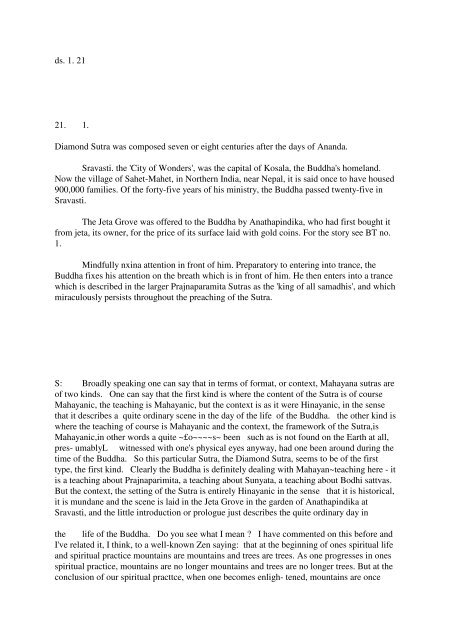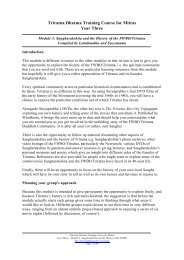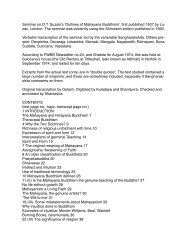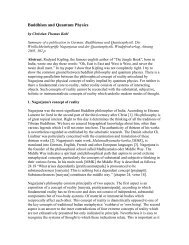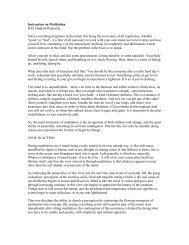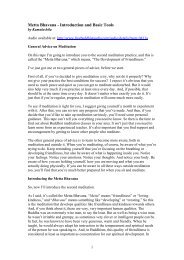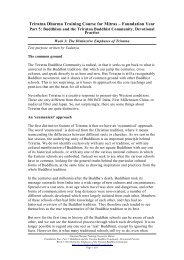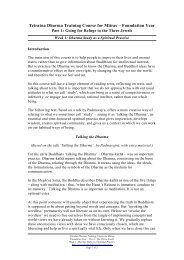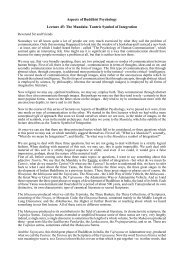Download whole text as pdf - Free Buddhist Audio
Download whole text as pdf - Free Buddhist Audio
Download whole text as pdf - Free Buddhist Audio
Create successful ePaper yourself
Turn your PDF publications into a flip-book with our unique Google optimized e-Paper software.
more mountains and trees are trees. So one could say that the ordinary Hinayana-type Sutra<strong>as</strong> we find in the Palids.I. ~~.Can on,corresponds to this first state in a way,where mountains- - are mountains and trees are trees ,everythiflrj' S - --very ordinary. It is the historical scene; the Buddha appears <strong>as</strong> an ordinary human teacher andhe is surrounded by quite ordinary, some- times quite nondescript looking disciples. Nothingvery wonderful happens. They go for alms, they mend their robes etc' . But no doubt theteaching is quite profound, is quite important. Then comes the Mahayana sutra of the firsttype where you are not on this earth at all, we may be in some other world. If you are on thisearth at all, that Earth is greatly transfigured and all sorts of wonderful things happen-As inthe Vimilakj~rti Nirdesa Sutra~like here you might say mountains are no longer mountainsand trees are no longer trees, everything is transformed, Everything is transfig- ured. But withthe third kind of Sutra, <strong>as</strong> exemplified by the Diamond Sutra, well, you are back again so tospeak a.t the stage where mountains are mountains and trees are trees. Everythi-ng is veryord4inary again, because- it is <strong>as</strong> though the unordinariness of things doesn't needunderlining, the ordinariness is the extraord- inariness, the extraordinariness is theordinariness, you know. Asa Zen saying says ag&t~ or a poem might be, I mean, howextraordinary 4'draw water and I carry fuel'. So it's almost <strong>as</strong> thoug~,I don't thinkI'm being to f~~'tful,it's almost <strong>as</strong> though the fact that the scene is very ordinary,almostp~edest~-4-an, with the Buddha just going for alms and coming back,eating his food andresting.It's almost <strong>as</strong> though,in the li~~~of the teaching ~~a~the Buddha eventually ,'tvL~,that the suggestion is,or the impre- s~ion that is conveyedks, that ordinary life isenlightenment <strong>as</strong> it were,enlightenment is ordinary life,e'nlightenment is to be found in themidst of ordinary life.You don't need all the wonde's a~a supernatural or supernormalhappenings to draw your attention to the wonderfulness of it.It's wonderful <strong>as</strong> it is. ~hewonderfulness doesn't need exaggerating.otherwise it's almost <strong>as</strong> if,to draw attenti?n to~hefact that you ha~~a nose,that the nose is a wonderful orga~,you paint it bright red(laughter).You know that will draw attention to it.But you know,to someone who really understandswhat a wonderful organ the nose is,that sort of decoration of the nose is not reallynecessary.Do you see what 4rrtean~ (pause).So,'1thus have heard,at one time,The Lorddwealt at Srav<strong>as</strong>ti in the Jeta Grove,in the garden of Anatha indika,to ether with a lar eatherin of monks,consisting
a~.~.of 1,250 monks,with many Bodhisattv<strong>as</strong>,great beings."Well here there's at le<strong>as</strong>t <strong>as</strong>lightly Mahayanic touch,because you won't <strong>as</strong> sa~va~ - Sutr<strong>as</strong>. findBodhisattv<strong>as</strong> not by nam~ in Hiana But it just says,"many Bodhisattv<strong>as</strong> greatbeingsW, their names are not~giverF7there's no descr%~p%ion. Thei£ jewelled headdressesaren't brought into it. They are just there. 11~arly in the morning the Lord- dressed, put onhis cloak, took his bowl, and entered the great city of Srav<strong>as</strong>ti to collect alms. When he hadeaten and returned from his r~unds, the Lord put away his bowl and cloak". You see howneat and tidy the Buddb~ is. (laughter) "w<strong>as</strong>hed his feet and sat down on the seat arrangedfor him, cross- ing his legs, holding his body upright, and mindfully fixing his attention infront of him. hen many monks approached to where the Lord w<strong>as</strong>, saluted his feet with theirheads," that is to say by bowing their heads at his feet, " thrice walked round him to theright", <strong>as</strong> a sign of respect "and sat down on one side". It w<strong>as</strong> not considered polite to sitdo~n right in front of the Buddha, directly facin~~ So that is quite clear, so onto Conze'scomments. "Thus have I heard at one time" This is the traditional opening of a <strong>Buddhist</strong>Sutra. Perhaps I should mention here that scholars con- sider that the first sentLnce of theSutr<strong>as</strong> generally is:" thus have I h ,eard at one time", not" thus have I heard" full stop." At onetime the Lord dwelt11.
ds. I.I'S~hakyan territory~4, the Buddha's homeland. If you consider that thew<strong>as</strong> incorporated into the kingdom of Kosala,then Kosala becomes the Buddh<strong>as</strong> homeland,"Now the village of Sahet-Mahet in ~orthern India,near ~epal1it is said once to have housed900,000 families" This is the Theravada tradition '1Lhink,probably quite an exaggeration."Ofthe forty-five years of his ministry,the Buddha p<strong>as</strong>sed twenty-five in Srav<strong>as</strong>ti." Notquite correct.He p<strong>as</strong>sed twenty-five rainy se<strong>as</strong>ons there according to tradition,but the rest ofthe time he'd be on tour,walking from place to place."The Jeta Grove w<strong>as</strong> offered to -theBuddha by Anathapindika,who had first bought it from Jeta,it's owner,for the price of it'ssurface laid with gold coins,For this story see <strong>Buddhist</strong> Texts NoI.Mindfully fixing hisattention in front of him',preparatory to entering into trance,the Buddha fixes his attention onthe breath which is in front of him.He then enters into~trance which is described in the largerPranjaparamita Sutr<strong>as</strong> <strong>as</strong> being the 'king of all £~adhiS'~ and which miraculous' ly persiststhroughout the preaching of the Sutra." This Sutra of course says nothing about thatsamadhi,that trance, <strong>as</strong> Conze calls it.This Sutra says that the Buddha simply fixes hisattention in front of him.He sat;this is a quite common sort of idiom,he just sat there,justmindfully,just watching the ~reath~but not distractedly- sat in a concentrated way,withoutdistraction,looking straight in front.A Voice:Is that what 'fixing his attention in front of him' means?B: It would seem so,yes.He'd be sitting up straight and looking in front of- him,mindfully,not in a s1e~-.~py sort of f<strong>as</strong>hion.not looking from side to side.Not distracted bywandering thoughts. Just sitting there.A Voice: Yes,because Conze says the Buddha fixes his attention on the breath which is infront of him,and I1'Je seen this glossedin that sort of way before.
S: Yes ,it may be,because,it's true to some extent.Because if you do just sit quietly and yourmind is not wanderin0g~,~ou~e not thinking of anything,you do become aware ofyour~breathing. So you can(in that sense)be said to,you know,be,to be fixing your attentionon the breath.Not that you ao it deliberately, ~would say One doesn't need to do itdeli'6erately,but <strong>as</strong> he sitsds. I.~s.there quietly and mindfully he quite naturally becomes aware of the breathingprocess.Perhaps his mind does sort of go on~o that, perhaps therefore his concentration doesdeepen,but the actual <strong>text</strong> says nothing of all that, in certain points.First Conze points out,inthe larger Pra1~aparamita Sutr<strong>as</strong>,larger meaning the longer versions in the hundred thousandshlok<strong>as</strong>,the eight thousand shlok<strong>as</strong>,and the twenty-five thousand shlok<strong>as</strong>,the eighteenthousand ti It 'I shlok<strong>as</strong> and so on,he enters into a trance~or samadhi whichisdescribed <strong>as</strong> the'king of all ~amadhis'and which miraculouslpersists throu ghout the preaching of the Sutr~.Sut that's a feature which is absent from thisversion.It's almost <strong>as</strong> though quite deliberately the compiler of this Sutra,who must have been-aware ofkhese other~sutr<strong>as</strong>,deliberately stresses the ordinariness of the s~,£~ ord krine~: ofthe occ<strong>as</strong>ion ,,the ordinariness even of th'eVUBuddha,perhaps for~re<strong>as</strong>ons that 4nentionedearlier on.- ~-~-. DS '2 -~ -~S.: It's <strong>as</strong> though the~natural .i~ itself W~ SU~£J~~\U~c&.~6'It doesn't need any addittons to them (Pause). Any further points arising out of this section?
Subhuti: Yes, one. It's very noticeable tho~~erthere are only monks present - there are nonuns, very often amon~st the /sutr<strong>as</strong> you have (S.: Yes, that's right)...the full <strong>as</strong>sembly.and the Up<strong>as</strong>k~s- -S~.: Yes. (Unclear) You have the Up<strong>as</strong>ak<strong>as</strong>,/ You have also the various cl<strong>as</strong>ses ofcC~estial bein~ all sorts of strange creatures present. It's almost suggesting that--no doubt themonks would be <strong>as</strong>sumed practically to be Arahants, apart from Ananda perhaps, in any c<strong>as</strong>e,highly developed beings -So it's a very select audience. You've got monks,~and you've gotBodhisattv<strong>as</strong> and you don't have anybody else.Jinavamsa: It seems~that theyore present~~~~he monks and nuns,Wt~o44--~~~n~~~~~ and~odhisattv<strong>as</strong> and the <strong>whole</strong> World~'~~." ~~.%~~. ~.~~ '~ Stc~C~~c\~t~~!~S.: Well, it doesn't the~beginning. Og't ~co-t&~~ ~ 'S - say~%what~v' the - W~~ addition~by a £ater scribe.IiSubhuti:The <strong>whole</strong> world (Laughter). I w<strong>as</strong> wondering about the composition of the Sutra.. it's late in the Prajnaparamita corpus, is it?S.: Yes. According to general-scholarly opinion, certainly according to Conze.,~e believes,and this seems to be quite re<strong>as</strong>onable~,~that first ofall there comes~ the most likely, the 'Ratnagun<strong>as</strong>amcayagatha',- the verses on the'Accumulation of Precious Qualities' - the. chapters of which rough- ly parallel the chapers of
the prose 'perfection of Wisdom' in 860-0 1ine~ or 8000 sk~ok~s. Certainly these twb arevery old, \tJhi6h is the-older perhaps can be disputed; but the we)ght of scholarly opinionseems to be that the 'Ratnagun<strong>as</strong>amcayagatha' is the older of the two, at 1-e<strong>as</strong>t the greater partof it. The first two chapters ~i-~~e\t~e~~ - be t?ie oldest of all. So one h<strong>as</strong> first of all thesetwo works: the Ratnagun<strong>as</strong>amcaya- gatha and the perfection of Wisdom in 8000 lines. Thenof course in the next stage one h<strong>as</strong> the expansion of the older shorter <strong>text</strong> in varyingdegrees~culminating in the 'Perfection of Wisdom in 100,000 S roughly speaking, and thereare other versions in, I think, 25, and I thi nk i0~o6~~~no 18; ~S'~~&\~'&ou~~&.lines~ butthe difference in length is said to be ~?~m~~;L~~;te~ oth~e, e \e ~ to w re~etition and listsarethey're copied out to vari~ereethen copied out. ~ if1~get versions4J~~A ygL4O~~OO~O,,i0O youof 18 or 25,00~0 S\'\3-~~%. - . After that there w<strong>as</strong> a period of contractio n - a third period -the- main ~utr<strong>as</strong> of which are the 'Diamond Sutra' andDS 2and the 'Heart Sutra'. Then comes fourthly, the 'Perfection of Wisdom' Sutr<strong>as</strong> whichincorporate Tantric features - in which the Perfection of Wisdom appears <strong>as</strong> a Goddess who isto be worshipped in various ways.Vessantara: What <strong>text</strong>s would fall under that heading?S.: I forget the titles of them but they're all quite short and they're collected together inConze's "Shorter <strong>Buddhist</strong> Texts". (Pause)Subhuti: Presumably, the compilers of these <strong>text</strong>s didn't sit down and say,'I've nevercomposed a sutra'; what do they consider themselves to be
doing? Are they drawing on, an accumulating tradition? Do you see what I mean? Howwould they have regarded what they were doing?S.: Well, this is something that c~an be considered in general terms because we find in mayliteratures, especially in many ~'\~~ou~ literatures, these, what we call 'pseudonymous' works,that is works atributed to certain famous people that could not have possibly been written bythem. There's a who?~2~d1~ne~ma~uu~e in, well, I w<strong>as</strong> going to say the Old TestamentApocrypha and the New Testament Apocrypha,but actually many works in the present NewTestament Canon itself are really pseudonymous. I mean the Gospels of Matth~w, Mark.Luke and John were not written by the apostles of those names. They may have been writtenby the disciples of those apostles who p<strong>as</strong>sed down, who recorded the traditions that they'dre- ceived froitheir m<strong>as</strong>ters and therefore, in good faith~ they attributed their works to them,but it would seem that in earlier times there wan t this same sort of feeling or sense of literaryproperty. Teachings, tradit - ions~were sort of common property and believed to haveoriginated with certain famous men or certain wise men, certain sages, and when you wrote itdown you were not writing a book of your own w~h you signed by your name. You werewriting down the teaching deriving frointhat particular person~ and it w<strong>as</strong> his teaching andyou signed it with his name. Do you see what I mean? (Subhuti: Yes) So in modern timeswe would tend to think of that <strong>as</strong> forgery~and no doubt if we were to do it today, with ourmodern sophisticatedco~sc'ou~~L~it would be sort of forgery; I mean supposing that we wereto write down a book, and we were to say, 'Well, this is a ~utra. This w<strong>as</strong> taught by theBuddha' . Well, it would be really a sort of fiction, because we don't really believe that, wedon't have that sort of background. We don't believe that we're~imply the amanuensis of youknow, teachings that we"Ie heard, that the true author is the Buddha. We don't feel that.There's an example when Nietszche wrote "Thus Spake Zarathustra"DS 2Q~. That's a literary fiction because he knew quite well that the Zarathustraof his book w<strong>as</strong> not the Zarathustra of ancient Iranian tradition. But many ancient writers,when they wrote down teachings that they had heard seem to hav~genuinely blieved theywere not the authors of those teachings - the authors of those <strong>text</strong>s. They were the mereamanuenses, the mere scribes. So they didn't put their own names. Of course, sometimes itmay have been that there w<strong>as</strong> a bit 6f wishful thinking and~anted to attribute Certainteachings to an honoured name1 and in this way the teachings became <strong>as</strong>cribed to certainpersonalities that were even at variance with their own views, their own opinions.
So one can imagine someone who would be perhaps, if there w<strong>as</strong> an originalcompiler, who w<strong>as</strong> the original compiler of the 'Diamond Sutra',<strong>as</strong> be~~~ eort of deeply imbued with the 'Perfection of Wisdom' teachings, andbeliev~'i~ that they went back to the Buddha but feeling at the same time that the existingversions were much too bulky, feeling that they needed to be condenseA 1even feeling that'hew<strong>as</strong> guided to do that by the inspiration of the Buddha or by the direction of his teacher. Imean perhaps his teacher suggested once upon a time 'We 11, you know, the things have beenrecorded in such and such sutr<strong>as</strong>, in a rather deta iled manner. It would perhaps be helpful forsome people if they could be recor~ed in a less detailed manner with the main pointsstressed.' So the disciple might have set to work and regarded . he'dbeen~oFos~~the author <strong>as</strong> a sort of alternative hisfrersion~which Sutra,because he~<strong>as</strong>only putting into another form the teaching of the Sutr<strong>as</strong>. He would not have imaginedhimself <strong>as</strong> deliberately compiling an original work which he then sort of fathered upon theBuddha. He would not have seen it in that way. (Pause)But perhaps it's difficult for us to$ente into this state of mind because we attach somuch importance to orl~~gl ality. Those things like copyright agreements, copyright laws,this w<strong>as</strong> all quite foreign to the thinking of people in ancient times, ~isdom w<strong>as</strong>n'tanybody's property.~ ~eaching w<strong>as</strong>n't anybody's exclusive property, or if it w<strong>as</strong>, well, it w<strong>as</strong>~theoriginal author himself, no~o~y else. So you didn't feel that you had any sort of personalproperty in what you learned. You learned it from your teacher. He learned it from his. If itbelonged to anybody it belonged to the orignal teacher. So any book that you wrote aboutwhat you'd understood could be in perfect good faith attributed to, <strong>as</strong> it were, signed with thename of, the originator of the <strong>whole</strong> tradition. I t all came from him. Not that it mattered:one version w<strong>as</strong> 1on~r, one version shorter t w<strong>as</strong> all his work. B<strong>as</strong>ica~ly you might havegenuine ly felt that you were being inspired by that original teacher, that original author. Andalso there w<strong>as</strong> the <strong>whole</strong> question of self-effacement; notDS 2~~. bringing yourself forward, not claiming anything <strong>as</strong> your own. (Pause)Originality not being regarded <strong>as</strong> a virtue, if anything <strong>as</strong> a failing (Chuckles) (Pause) So it'squite a different climate of opinion isn't it? Though to us it cannot but/appear <strong>as</strong> almostintellectual dishonesty. Perhaps, you know, in ~~~~ it did <strong>as</strong>sume sort sort of tinge ofthat. Perhaps people, were at a much later stage sufficiently sophis- ticated to realize that,well, they were p<strong>as</strong>sing off something <strong>as</strong> theteaching of an ancient sage tha~waan't really his. They might have had ft~ciis~ some sort ofcon~ ,' of that sort. But probably f ~- that whatthey were doing w<strong>as</strong> justified. (Pause)
____________ Do you think that considering originality <strong>as</strong> a virtue can actually bequite a hindrance. You then try to be original.S.: Well, then you try to be original by merely being different. (Pause) Well, I meansometimes you are genuinely original and because you are original you~different,but you'renot necessarily original just because you are different. For instance, it's said about theImpressionist paint- ers, I hope this is correct - I'm going to give it <strong>as</strong> an example - that theywere the first to see that shadows were purple, is that so? That shadows hadn't been depicted<strong>as</strong> purple before. So they were original, in that respect. They were different <strong>as</strong> wel)j<strong>as</strong> beingoriginal because the way they depicted shadows differed fro#he way in which previous artistshad depi cted shadows. But they saw differently. They had an original vision, so there w<strong>as</strong>originality and also difference. But supposing they hadn't actually seen shadows <strong>as</strong> purple.Supposing they'd merely observed that painter 5 usually represented shadows <strong>as</strong> black, or atle<strong>as</strong>t dark blue or brown, and just wanted to be different so that, one way of being diff- erentw<strong>as</strong> just to paint the shadows a diffe~ent colour. So they painted them purple, not becausethey ~aw them purple, but .just because they want- ed to be different. That would be anexample of the sort of thing that I'm ~a~K~ng about. (Pause) So sometimes you know, ifyou're w'c'~\} diff- erent the difference can be purely artificial, mechanical or meaninglessand not be suggestive of any sort of originality or individuality, but we attach so muchimportance to individuality nowadays - what we think of <strong>as</strong> individuality - so muchimportance therefore, to originality that sometimes people need to be different at all coststhinking that they are thereby original and thereby <strong>as</strong>serting their individuality or s~ing thatthey are individuals. But all that is purely reactive.S~a':\i pro\c~~ ___ So could you say that originality only really occurs when somebodyactually sort of trans~cends himself to. ...DS 2__ ~o. S.: Well, you could say transcend yourself or you re actually being yourselfwhen you are expressing what you see because nobody else can see what you see, <strong>as</strong> you
see it. You're being an individual, you're being original, you're being free when you give express- ion to your vision, towhat you see. (pause) But it isn't enough, you know, to just take somebody else's vision andmerely reverse that. that <strong>as</strong> meant in a mechanical wort of theoretical - intellectual way. Thatdoes not make you original or any more of an individual. If somebody else paints tigers withblack stripes and you paint them with blue stripes, well that doesn't make you original.(Pause)So perhaps we should think in t"erms, of a sort of stream of trad- ition, in this c<strong>as</strong>e <strong>as</strong>tream of Perfection of Wisdom tradition, with this stream sort of crystallizing here and thereinto smaller or larger lumps (so to speal), wh~~h are the different Sutr<strong>as</strong>, none of whichexhausts, you know, the content of that tradition.. (Pause) Some are small and spark- linglumps and some lumps are large and impressive. Some are of a man- ageable size and someare not of a manageable size. Some are much too big, some of them even much to~small .(Pause)Subhuti: How far back can stream of tradition be traced1 or does itspring forth fully~armed f'ii\t i£t 'A ~~ 7 ~u ~S~V%~C~'\~~~(~o ~ S.: I don't think there is a continuous literary tradition going straight backto the Buddha, but no doubt with 'The Perfection of Wisdom in 8000 lines'~~~ the'Ratnagun<strong>as</strong>amcayagatha', we go within say 500 years of the Buddha's time which is no ne~rer or no further than the Pali Canon goes <strong>as</strong> a literary document~ and there is a traditionthat the Mah<strong>as</strong>anghik<strong>as</strong> had a teaching about wisdom which w<strong>as</strong> differerit~ated to someextent from other schools. And there's no doubt that the Buddha did speak in Kerms ofwisdom; he did use the term wisdom; he did use the term 'sunyata'. It may be that the <strong>whole</strong>perfection of Wisdom tradition could be regarded <strong>as</strong> a continuation and development of theBuddha~ own teaching on prajna sunyata which w<strong>as</strong> perhaps not fully recorded in the PaliCanon. There are some Sutt<strong>as</strong> there are some <strong>text</strong>s in, for instance, the 'Sutta-Nipata',wh~~~h seem to hint at a point of view or approach somewhat similar to that of thePerfection of Wisdom teachings though not, you know, developed in that sort of almost sophisticatedmanner. In the for instance. (Longpause) Any further points arising outof that section?Voice: Just one small one. Might seem a bit silly but the Buddha did actually himself go outto collect alms but he didn't let his disciples go out and collect alms for him.
DS 2~ I. S.: That w<strong>as</strong>n't always the c<strong>as</strong>e, because for instance, when the Buddha w<strong>as</strong>teaching the first five disciples we are told that when he w<strong>as</strong> teach- two, three of the4rent into collect alms for the <strong>whole</strong> party. So, you know, there were occ<strong>as</strong>ions on which othermonks went, so to speak ,and begged for the Buddha, but certainly here he's represented <strong>as</strong> going ~vL himself andbegging and that seeins t~~his more usual practice. (Pause)Voice: That carried on up to his parinirvanaS.: It would seem, yes. Though of course, at the same time he accepted invitations.Sometimes people brought him food or invited him to their houses for a meal. According tothe Vinaya there are three ways in which a monk ~a bhikkhu can obtain alms , obtain food.One is by actually going on his alms round, another is by accepting invitations to the housesof the laity~and the third is by allowing the laity to bring food to the . (Long pause)Subhuti: One small point, is this business about not sitting directly in front of the Buddha.W<strong>as</strong> this a general Indian tradition?N'~v~ S.: It would s4n tokbe a general Indian Tradition but <strong>as</strong> it were, out of respect tothe teacher, you didn't front him. This w<strong>as</strong> considered perhaps a bit aggressive, a bitlacking in modesty, though significantly this w<strong>as</strong> dropped in ajsense within the con<strong>text</strong> of theVajra- yana. There, on the occ<strong>as</strong>ion of initiation one is supposed to sit dir- ectly in front ofthe teacher~ even to look at the teacher, even look the teacher in the fact-which isconsidered immodest and impiper within the Sutra con<strong>text</strong>, within the Hinayana con<strong>text</strong> eventhe Mahayana con<strong>text</strong>. This of co$se, perhaps stresses the fact that within the Vajray~~~cons?L~~ <strong>text</strong>, from the point of view of the tantra, there is a much more personal tie or link orcommunication between the teacher and the disciple~ within the Hinayana and Mahayana itis, so to speak, more impersonal - more almost, I won't way institutionalized or institutionalbut not so intense- ly personal <strong>as</strong> it is within the con<strong>text</strong> of the Vajrayana. (Pause)
So the monks sit down on one side or sit down to one side, to the right and to the leftof the Buddha. Yes, it -is also this arran- gement is preserved in Tibetan temples eventoday~~+~a~n~a1ogY -beca use there are rows. It's a bit likeCathedral, the rows of seats one on either side.- the choir in an AnglicanYou don't have rows of seats cross-wise, well not till we get back into the nave9 and the choirseats which were the seats originally for the ~onk~~ and originally only the monks wouldhave been present on most occa- sions anyway.DS 231. So the more traditional <strong>Buddhist</strong> arrangement if you reflect the seatingarrangements at the time of the Buddha,when the Buddha himself w<strong>as</strong> present~ you shouldn'tbe stting facing the shrine. You should be sitting to one side. I don't know whether weshould do anything about that. Maybe it should be thought about. I think it s~~a'r~~~~~matter of space. We~v~ ~~~to squeeze in <strong>as</strong> best we could. ~2ows you'd pro~ablyget more in. You'd have a(Long sort of narrow gangway which means that the view ofthe shrine is U~obstructed, with rows of monks,or Up<strong>as</strong>ik<strong>as</strong> or Dharmacharis or mitr<strong>as</strong>,sitting to either side,which means also there's room for prostrations in the middle~ and ofcouse in Tibet, room for the Proctor to walk up and down with his staff to see whetheranybody is dozing (chuckles) or giggling or not paying attention to the proceedings. And ofcourse if they're doing any of these things he just seizes them by the scruff of the ne~t4 andgives them a few blows with his heavy staff (chuckles) - they have to prostrate themselves onthe ground; they mustn't offer any resistance and just receive the blows. Yes, I think he, <strong>as</strong> far<strong>as</strong> I know, drags them out into the aisle and administers a few thwacks (Laughter). It didn'thappen in the Buddha's day.Subhuti: The same arrangement is preserved in the Zen tradition, isn't it?S.: Yes, yes. But perhaps we should think about that. In Theravadan countries, it'sconsidered more polite and more decent, especially in the c<strong>as</strong>e of women to sit sort of sideways, not sit cross-legged but to sort of kneel sideways facing the image if you face at all.And of course, in the c<strong>as</strong>e of the Tibetan arrangement within the strine, of the two rows theone is considered <strong>as</strong> it were, more honourable so whoever is at the head of the morehonourable row is the sort of leading or senior person. If I remember rightly, and I wouldn'tbe altogether certain of this, the one of the right at the head of the right hand row <strong>as</strong> you enter
the shrine is the seniormost of all; opposite him is seated the next most senior who usuallyleads the proceedings and then next to them are the slightlylowe:~ their respective juniors, so to speak. I don't know how that would accord withide<strong>as</strong> of the democratic view do you? (chuckles) wa might perhaps try out that sort ofarrangment at Padmaloka. We could think about it.Subhuti:We've got that long shrine room.S.: Yes, yes. You also have a sort of door keeper sitting next to the door right at the backwith his back to the wall. He h<strong>as</strong> a special sort of seat in Tibetan temples. I don't know,maybe not doorkeeper but some sort of official~right at the back. I forget what his dutieswere.DS 2Perhaps they were, you know, partly doorkeeper. 33.It would probably be quite good for ~uj<strong>as</strong>, because you could hear everybody,youknow, <strong>as</strong> when you're sitting forward you usually don't really hear what's going on.S.: We'll go onto ib. Yes there is one further point about it. Conze says right at the end ofthis section. "He then enters into a trance which is described in the larger Prajnaparamita
Sutr<strong>as</strong> <strong>as</strong> the 'king of all Samadhis' and which miraculously persists throughout the preachingof the Sutra". It's suggesting though it didn't specifically mention in the c<strong>as</strong>e of this Sutra,that the Buddha's teaching does definitely proceed fro4a higher level of consciousness - fromenlightened conscious- ness. Alright. Would someone like to read the <strong>whole</strong> of 1 b.J1~o-va~msa:ib.Subhuti makes a request- 2. At that time the Venerable Subhutl came to that <strong>as</strong>sembly, and sat down. Then herose from his seat, put his upper robe over one shoulder, placed his right knee on the ground,bent forth his folded hands towards the Lord, and said to the Lord: 'It is wonderful 0 Lord, itis exceedingly wonderful, 0 Well-Gone, how much the Bodhisattv<strong>as</strong>, the great beings, havebeen helped with the greatest help by the Tathagata, the Arhat, the Fully Enlightened One. Itis wonderful, 0 Lord, how much the Bodhisattv<strong>as</strong>, the great beings, have been favoured withthe highest favour by the Tathagata, the Arhat, the Fully Enlightened One. How then, 0 Lord,should a son or daughter of good family, who have set out in the Bodhisattva-vehicle, stand,how progress, how control their thoughts?' After thue words the Lord said to the VenerableSubhuti: 'Well said, well said, Subhuti! So it is, Subhuti, so it is, <strong>as</strong> you say! TheTathagata, Subhuti, h<strong>as</strong> helped the Bodhisattv<strong>as</strong>,_the great beings with the greatest help, andhe h<strong>as</strong> favou6ed~~~~the~~m~ with the ~gk-es~ favour. Therefore, Subhuti, listen well, andattentively! I will teach you how those who have set out in the Bodhi.attva- vehicle shouldstand, how progress, how control their thoughts.' 'So be it, 0 Lord', replied the Venerable Subhutiand listened.Information about Subbuti will be given on page 45.-The Buddha is Well-Gone,because on the holy eightfold path he h<strong>as</strong> gone to Nirvana.A Bodhisattva-from bod~i = enlightenment, and =ttva - being, or essence. Someonewho is destined to became a Buddha, but who, in order to help suffering creatures, selflesslypost- pones his entrance into the bliss of Nirvana and his escape from this world ofbirth-and-death. Sometinles I have trans- lated 'Bodhi-being' where the con<strong>text</strong> seemed tojusti~y it.DS 2
A great being, mahJsaUva. Mah~ means 'great', and sattva s4. either 'being' or 'courage'.Nagarjuna gives a number of re<strong>as</strong>ons why Bdhsattv<strong>as</strong> are called 'great beinns'. It - is becausethey achieve a great work, stand at the head of a great many beings, cultivate the greatfriendliness and the great comp<strong>as</strong>sion, save a great number of beings (<strong>as</strong> in chap- ter 3). TheTibetans translate mah<strong>as</strong>~attva <strong>as</strong> 'great spiritual hero'. According to the Acin~y<strong>as</strong>ut~ra his<strong>as</strong>pirations are truly on a heroic scale. He desires to discipline all beings everywhere, to serveand honour all the Buddh<strong>as</strong> everywhere, and to purify all the Buddha-fields everywhere. Hewants to retain firmly in his mind all the teachings of all the Buddh<strong>as</strong>, to have a detailedknowledge of all the Buddha-fields, to comprehend all the <strong>as</strong>semblies which anywhere gatheraround a Buddha, to plunge into the thought of all beings, to remove their defile- ments, andto fathom their potentialities.The Tathagata, Arhat, Fully Enlightened One-this is the official title of a Buddha, and itwould be too long to explain here its meaning in detail. For 'Tathagata' see chapter 29.Helped-because thanks to the Tathagata the impediments which at various timesthreatened their spiritual development - have had no po~~wer~toeff~e~i~\ke~ly~~hin&er it. Favoured-because they were entrusted with this sublime teaching.Son of good family-Sanskrit k-sara (ktda = family, ~ra = son). A Asaa~ra pOssses either agood spiritual endowment, or a good social position, or both. The word is regularly used <strong>as</strong> apolite form of address, and h<strong>as</strong> no very i)ft~ise meaning.Set out in the Bodhisattva.vehicle,-in these Sutr<strong>as</strong> it is always <strong>as</strong>sumed that salvationcan be won in different ways, or by different paths. Usually three such 'vehicles' aredistinguished - that of the Arhats, that of the Pratyekabuddh<strong>as</strong>, that of the Bodhisattv<strong>as</strong>.The question at the end is equivalent to: 'How should perfect wisdom be practised?'Stand, or 'abide', refers to the deter- mination to reach enlightenment, which directs all theactions of a Bodhisattva; progress, to his steady growth in con- centration and wisdom;control thought, to his ability to keep distractions away from the calm core of his inwardmind.S.: Is there any question on that, beginning wit~he actual <strong>text</strong> itself. Anything not c~lear.There's one little point. "Then he rose from his seat, put his upper robe over one shoulder"That might give one the wro~g impression. Actualy, when the monk arrives, when Subhutiarrives in this c<strong>as</strong>e, both shoulders are covered, so it's not so much that he puts his robe overone~hou1der, but he uncovers one shoulder ~S~ a -sign of respect before making hissalutation. Even now the custom is) not only in the Theravadin countries but in Tibetalso~that you never keep the right shoulder, if you're a monk, covered with your robe, when
you make salutation to the Buddha ; if you're wearing your robe round both shou1ders~thatwould be the robe which is referred here <strong>as</strong> the cloak- you take it off the right shoulder andbring it round under the arm over the oppo~te shoulder before making your salutation. Youdon'tDS 2 ~&'\ s\'~o'\&t~ ~~%~~ \~ ~~.~t~j ~U~ ~O~ 6)~\Lsalute the Buddha with both shoulders covered with the official robe.~ These are all 1i~leways in which tradition is kept up. But you notice, say in Theravadin countries, wl
them'? Conze' 5 note says:" '~elped-because thanks to the Tathagata the impedi- ments whichat various times threatened their spiritual development have had no power to effectivelyhinder it "and ~'~Favouredtbecause they were entrusted with this sublime teaching". Do yousee any sort of b<strong>as</strong>is to that distinction? I mean what does favoured especially suggest?We don't have a Sanskrit <strong>text</strong> so we can't refer to the original term, but just taking the Englishword literally which I think we're justified in doing, why is this word 'favoured' used here?Subhuti~~:It means sort of singled out. That's the indication, isn't it? VThat favored before others. kDS 2 3~.S.: In a sense, yes, but a faVour. What is a favour? A favour essen- tially is somethingthat you haven't deserved, so if it is of a purely Transcendental teaching, how can thatteaching be merited by any amountof skilful meritorious and mundane behaviour. Do you see what I mean? So that the teachingbeing purely Transcendental, comes, <strong>as</strong> it were, <strong>as</strong> an absolute favour, a free gift; it's nothingwhidh under the Law of Karma, they've actually deserved. They cannot deserve it, be- causeit belongs to another order, another dimension. (Pause) So the word 'favoured' is used hererather than the term 'helped'. (Long pause)(End of A Side)Subhuti:What about Conze' 5 understanding of 'helped'? It seems a bit strange.S.: I think he's fol+owing the commentaries here. (Subhuti: Yes) "~use thanks to the Tathaata, the impediments which at various times threatened their spiritual development have hadno ower to effectivel hinder it" (Pause) Presumably the Buddh<strong>as</strong> are continually
encouraging them and inspiring them~ or The Buddha. (Long Pause). I mean could you notintroduce that distinction between helping and favouring at a very much lower level? Say1 alevel of Kalyana Mitrata. Supposing you <strong>as</strong> an Order Member, stand in relation <strong>as</strong> KalyanaMitra to a Mitra, how would it work out on that level, that you help him and that you favourhim? What would you say? How would you help him? (Pause)Jinavamsa: I suppose you could always help with the sense of just being what you are.S.: No. Following this and taking Conze's comment <strong>as</strong> a guide.Vessantara: If you took his comment, presumably, you'd help him if he had difficulties withthings and talk over things that he w<strong>as</strong> having problems with. Then you'd also inspire him oryou'd suggest - you'd be open.S.: Yes. If he had difficulties, with his medita ton or couldn't get on with his meditation ordoubts and reservation about puja and other devotional practices. You'd help him by talkingthese difficulties over with him and helping him to overcome those impediments.And thenwhat about favouring him? How would you favo ur him?Vessantara: You'd have to find some way of inspiring him. You might introduce him tosomething (Unclear)DS 2
3e1. S: And then try to lift him or help him to lift himself onto an entirely newlevel in a way giving him something that he didn't deserve. Maybe it's sharing your ownexperience with him or your own understanding with him, going beyond just helping him~going beyond the sort of problem-ridden, problem-oriented level, so to speak. He may notneed any help. All these impediments on this level may hav+een overcome. He may be qutehealthy, happy, human - f<strong>as</strong>t becoming spiritually mature. But you can favour him by aglimpse of something even higher, which perhaps he couldn't have achieved by his owneffort, not at that particular stage, not at that particular time. So helping seems to be relatedto actual difficulties experienced, where<strong>as</strong> favouring seems not to have that reference.Favouring refers to sharing with the person concerned something which, in a sense, he doesn'tdeserve. Something which is not in a way, to be looked for inv;.~~ of his development so far;goes altogether beyond his present level. So it comes to him <strong>as</strong> a sort of favour therefore in <strong>as</strong>ense, a jump or a leap in his development.Shantiprabha: Could you look atk<strong>as</strong> a transference of merit?S.: You could, but one is not really concerned with merit here, is one? It's <strong>as</strong> though itgoes beyond the level of merit, even transferred merit altogether.Shantiprabha: I w<strong>as</strong> thinking more in a mundane sense.(61o~s 'jv'~~~~ - - - 4'S.:There is a distinction between merit - Punya,and Gunyana.~,~~presumably goes far beyond even the transference of merit. (Long Pause) UThen there's this question of 'son of good family - Sanskrit kulaputra(kula= family, putra son A kulaputra possesses either a good spirit- ual endowment or agood social position or both. " Traditional Buddhism seems to have attached quite a bit ofimportance to being not only o~ood spiritual endowment but also having a good socialposi~on. It's <strong>as</strong>though certain dvantages even from a spiritual point of thagaveoe~0~ o,'4~ 'J,~~.view4 So wha~~~t~a~L%ne ot to say about that? Is there any truth in it?
It's a bit more like what we would call in modern days, well-educated. Does this help1 to bewell-educated?- ~o be a Kulaputra-or is it a hin- drance or is it just a matter of indifference?______: Well got something to understand it's an attributetoalso one h<strong>as</strong> chose for oneself social position in a sense.DS 2S.: But does it? Does it help one to have that intellectual under- standing. If you'rewell-educated, you may have intellectual understand- ing of Buddhism but does anintellectual understanding of Buddhism help you in your spiritual life, we may say?______ Yes, it does in af\. .~T\} ~~~~.S.: Yes, it does. Ananda: (unclear) stage.Vessantara: certainly rather than intelligence...S.: It certainly helps when you come to communicate Buddhism. There's also the questionthat - if you are in a good social position and con- scious of that, it does give you a feeling of
self-confidence which is helpful psychologically and even spiritually. One notices this inIndia amon st our ex-untouchable <strong>Buddhist</strong> friends. They're very much lacking i ~&'if'j-confidence, even confidence in many general ways, just because of their lowly social origins.For instance they have great difficulty in dealing with government officials. They just don'thave that ability - though some of them now are government officials. But broadly speakingthey have great difficulty in dealing with government officials. In approaching them they'requite nervous and hesitant, lack- ing in self-confidence. Well, we do find that even inEngland, don't we? I mean there arc some people who deal with greater confidence with peoplelike bank managers, than do others. Perhaps, some pe~e haven't seen a bank managerbefore (chuckles). Others perhaps have been deal- ing with them all their lives, well, at le<strong>as</strong>ttheir parents have. Well that does give a certain confidence.Amogavira:Isn't there another side, where it could be arrogance <strong>as</strong> well.S.: Oh yes. Well you do find that in India again at the other end of the social scale with theBrahmins and Sa~~~'I~S - They certainly suffer from arrogance which is a great spiritualhandicap. (Long Pause) You notice that according to the his <strong>as</strong>pirations £that is tosay, the Bodhisattva's <strong>as</strong>pirations~are truly on a heroic scale.He desires to discipline all beings everywhere". This word 'discipline' <strong>as</strong> a verb is perhapsnot very fortunate. It's more like 'mature', to help develop, to help grow, "all beingseverywhere, to serve and honour all the Buddh<strong>as</strong> everywhere and to purify all theBuddha-fields every- where". What's meant by purify aBuddha-field? How does one goabout that~DS 2Subhuti: By disciplining beings. ~9,
S.:So how would that purify the Buddha-fields?Jinavamsa: Would get rid of all the lower realms andgods.S.: Yes. Buddha-fields or spheres of a Buddha's influenceare divided into two kinds, pure and impure. The impure are those in -- which the lowerrealms of existence are present (Pause) "He wants to retain firmly in his mind all theteachings of all the Buddh<strong>as</strong>, to have a detailed knowledge of all the Buddha-fields, tocomprehend all the <strong>as</strong>semblies which anywhere ~ather around a Buddha, to plunge into thethought of all being~, to remove their defilements and to fathom their potentialities".It's(~r~v~~cor~that~odhisattva re presentS the spir- itual ideal on an unlimited or cosmicscale. It 4o~s become difficultto think ofa Bodhisattva <strong>as</strong> an individual in the ordinary sense~ on 'Ithis level. \\e desire~to discipline all beings everywhere . Well, thissurely seems to refer to the operation of a sort of cosmic principle rather than an individualperson in the ordinary sense. Perhaps, you <strong>as</strong> an individual identify yourself with thatprinciple. (Long Pause)Yes, also Conze says, "the Buddha is1 Well-Gone\because on the \'oly ~ightfold ~athhe h<strong>as</strong> gone to Nirvana". 'Well-gone' means 'Sugata'gone, 1well-gone' to a happy state. I did mention a little while ago that it's only a sort ofhistorical accident that <strong>Buddhist</strong>s are called <strong>Buddhist</strong>s because Buddha is only one of theBuddha's titles. He's also called Sugata, and Jina and in medieval India, Hindus often refer to<strong>Buddhist</strong>s <strong>as</strong> not only(1.~~~~ followers of the Buddha, but Sugat<strong>as</strong>, follower 5 of theSugat<strong>as</strong>. So it's almost an historical accident that we're not called 'Sugat<strong>as</strong>' instead of<strong>Buddhist</strong>s: Ha-pyists or Happies instead of <strong>Buddhist</strong>s (Chuckles) or Conquerors inst ead of<strong>Buddhist</strong>s, or -Jinaists. Well the Jains a~~ ~a~lled Jains after Jina aren't they? It would bejust <strong>as</strong> logical tot<strong>Buddhist</strong>s, Jainers or Jainists and the Jains <strong>as</strong> <strong>Buddhist</strong>s because their Jina isalso called Buddha just <strong>as</strong> our Buddha is also called Jina. So if one thinks in this sort of way,maybe it helps one to get a~~y~ to move away from purely accidental and histor- icalconditioning. There are lots of other things that we could be called.
Subhuti: When it says, "How should a son~r daughter of good family, who have set out inthe Bodhisattva-vehic le, stand, how progress, how control their thoughts?", does this mean aBodhisattva or one who is fol- lowing the~'~~~Z~n a more genral sense?DS 240. S.: Well, the two I suppose, really coincide. It's not quite clear what"set out in the Bodhisattva-vehicle" means. Whether it means someone who h<strong>as</strong> adopted theBodhisattva Path <strong>as</strong> a discipline and who h<strong>as</strong> not yet at- tained the first Bhumi or one whoh<strong>as</strong>, in fact attained at le<strong>as</strong>t the first Bhumi. It's not quite clear what "setting out" here meanS.I would think that it doesn't mean one who h<strong>as</strong> already obtained the first Bhumi.There could be a sort of an~;thesis between "The Tathagata, Subhuti h<strong>as</strong> helped theBodhisattv<strong>as</strong> the ~reat 6eings with the greatest help, and he h<strong>as</strong> favoured them with thehighest favour. Therefore, Subhuti~ I;s~~ wL\l a~& ~~~v'V~ve\ -I will teach ou howthose who have set out in the Bodhisattva-vehicle stand". So it is suggesting those who fallshort of irreversibility either those who are simply Bodhisattv<strong>as</strong> of the Path or who perhapshave not yet attained even the first of the Bhumis. (Long Pause)You notice Conze translates 'i'oly eightfold ?ath' and not ~oble ~ightfold ~ath. ButAryan can be translated(?t\~\~cr~¼. You alsonotice that under" 'Bodhisattva'-from 6odhi=enlightenment and S~t~~=who, being, oressence. Someone who is destined to become a Buddha, but/in order to help sufferingcreatures, selflessly postpones his entrance into the bli~ of~irvana~ and ape \rom thisw~4d h-a~death.11~he almost exoteric version ~~t~in ~rb'L5 'S ~r ~~ sqMutg~ ~a~cannot l~)~erally01, <strong>as</strong> much <strong>as</strong> onepostpone Nirvana. It is more that in the course of his spiritual pro- gress, the Bodhisattva isless and less able to make any genuine dis- tinc ton, any real distinction between helpinghimself and helping other people. He sees more and more that they're different <strong>as</strong>pects of thesame process. You can't help yourself without helping others; you can't help others withouthelping yourself. So there aren't really two quite distinct Spiritual Ideals, the Arahant Idealand the Bodhisattva Ideal, each of wh ich can be really followed through to the end. Thefurther you progress on either so-called path, the more you see that the two ideals coincide orcoalesce. I think we have gone into this quite thor- oughly before on a num~er of occ<strong>as</strong>ions.So unfortunately this sort of antithesis arose within historical Buddhism, or even thisthree-fold distinc ton occurred. -The Pathof the Arahant, the Pratyekabuddha and theBodhisattva . You need the White Lotus Sutra to emph<strong>as</strong>ize that the three Yan<strong>as</strong> which never~hould really have been differentia ted to that extent, are in fact one Yana: Ekayana. (Pause)
~""iak : Going back to something you were saying quite a few mo~L~S ago, it seems importantto remember the extent to which we could help otherpeople. I think you were making theboint that the Buddha h<strong>as</strong> favoured


